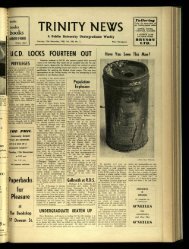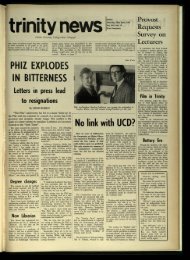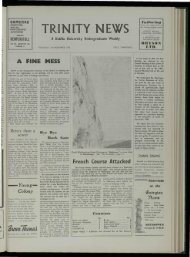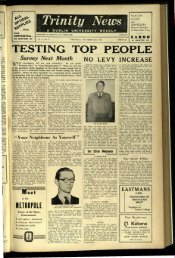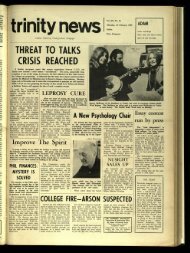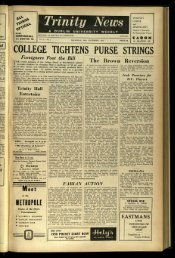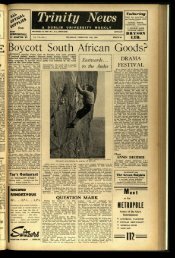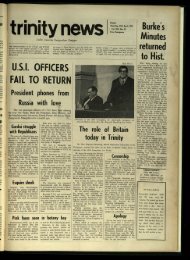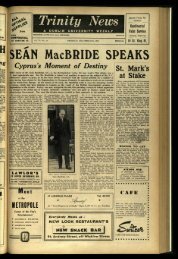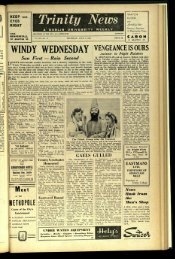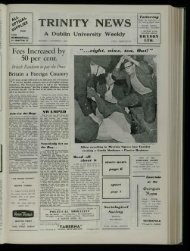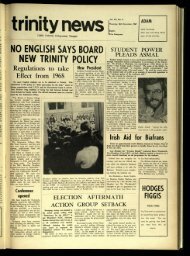TUDEN RALLY IN DHAC PROT - Trinity News Archive
TUDEN RALLY IN DHAC PROT - Trinity News Archive
TUDEN RALLY IN DHAC PROT - Trinity News Archive
You also want an ePaper? Increase the reach of your titles
YUMPU automatically turns print PDFs into web optimized ePapers that Google loves.
1969.Gardi Marchersconfront on br ’dge--Courtesy " Irish Times "alltwoforDublin UniversityThursday, 23rd Janunary, 1969StudentI TCD OFFERS DAYheirer’ I NURSERY SERVICE<strong>News</strong>paperPrice 6d.whothat i The College Day Nursery will open next week at 200risesThexed-has,weszen.lavelvestax-:ime:iety3rolent,:tters toturefore ofaoretem.oralalts,lernvhatwillthis:intionlive~ .tS,profiid,n toemtuartlard;Ray2olinlarry)avidaves-1.Pearse Street, under the control of Mrs. David Little, atrained nurse. She hopes to keep the Nursery open duringlecture hours each day in term-time. The premises wereextensively re-decorated during the Christmas vacation,thanks to a generous donation from the <strong>Trinity</strong> Trust,together with smaller sums from the Capitation Committeeand the Student Health Service.The venture is primarilyconcerned with providing aservice for students, but staffmembers’ children will alsobe welcome. The charges forstaff will be 2/6 an hour, 8/-a half day, 15/- a full day or£3 10s. a week. Students willbe charged a slightly lowerrate (1/6 per hour, 5/- forhalf a day, 9/- a full day and£2 a week). Those interestedin making use of the Nurseryshould contact Mrs. Denard,Dean of Women Students.~Charlie ScottA new statue has appearedin the Bio-Chemistry Department.Its installation wasnot made known to the pressthrough a dedication ceremony.(See Arts page).BORED BY THEBUTTERY BAR tTHE NEWLY OPENEDSuffolk Houseis only a hundred yards frorrFront Gate<strong>IN</strong> SUFFOLK STREET<strong>TUDEN</strong><strong>DHAC</strong> <strong>PROT</strong><strong>RALLY</strong> <strong>IN</strong>TOver the past two weeks the ideals of the Dublin Housing Action Committee have atlast been forceably brought to the forefront of public attention. The recent events werecatalyzed by the imprisonment of Mr. Dennehy, afat her of two, who, forced by circumstances,was squatting in a one-room flat in Mountjoy Square. The landlord (at presentholidaying in the Bahamas) has refused to accept rent, as he wishes to convert the buildinginto offices.Mr. Dennehy was arrested andimprisoned in Mountjoy Jail.Since his arrest he has been onhunger strike, and has now beentransferred to Mountjoy Hospital.Starting with the Civil Rights’march last week, the D.H.A.C. hasheld several meetings throughoutthe week, to bring the affairs tothe notice of the public. Joinedby students a protest meeting washeld on Tuesday, 14th, at whichtraffic was held up. This was followedon Wednesday by a sitdowndemonstration outside theDepartment of Justice. T h e-Minister refused to speak to thedemonstrators, and at 2.30 thepolice moved in and bodily removedthirteen of their number.By 3.30 a solidarity meeting hadbeen helyd in Earlsfort Terrace,resulting in a huge gathering ofstudents marching from the collegewith intentions of occupying theDepartment. By this time thepolice had barricaded the hallway.Five demonstrators broke throughthe barrier while the rest sat onthe steps. An impromptu seriesof speeches began.The students within the buildingcame out on request. Meanwhilea huge build-up of squad cars andblack marias surrounded the protesters.Then without warning theGuards branishing batons attackedthe demonstrators, whose policywas one of non-violence. Thirteenwere hurled into the wagons, butwere soon released when it waslearned that Mr. Denis Turner, aU.C.D. lecturer of political science,was among them. The police thentook over the steps and the demonstratorssat down on the road.Finally at a quarter to 8 theymarched to Abbey Street andlinked up with the Action Com---Courtesy "United Irishman"Mr. Denis Dennehy, now inMountjoy Hospital after hishunger strike protesting his imprisonmentfor squatting in avacant flat with his wife and twochildren. He is a member of theD.H.A.C.mittee. After a short meeting, thecombined forces marched toMountjoy Jail. At this stage thecrowd was at least 500 strong andgrowing steadily. A mock trialof Mr. Underwood, the landlord,was held outside the prison, inwhich he was sentenced to life imprisonment.The people thengradually disbanded.On Saturday at least 800 protestersgathered outside the G.P.O.where a huge meeting was hel&Fr. Sweetman, among others,addressed the crowd. The demonstratorsthen marched upO’Connell Street, turned at theParnell Monument and moved enmasse towards the bridge wherethey sat down on the road, blockingD’Olier St. and WestmorelandSt. and the adjoining quays. Atthis point a line of Guards about200 strong charged upon the crowdswinging truncheons. S e v e r a 1women and children were takento hospital. Many of the demonstratorssuffered broken arms orribs. Eventually overcome bybrute force, the marchers were splitinto small groups and disbanded.Some, however, made it back tothe G.P.O. where a final meetingwas held. Mr. ProinseasMcAonghusa and Mr. Brown ofthe D.H.A.C. were among thespeakers.This Monday the Lord Mayorof Dublin made a special plea tothe Taoiseach requesting the releaseof Mr. Dennehy. Apparentlyno action has yet taken place.Tuesday night another marchwas led down from the G.P.O. tothe Mansion House without incidentand included members ofU.N.S.A., the Republical Cluband Divinity students.Law Society issuesFirst JournalNext week sees the publicationof the Dublin University LawReview--the first venture of itskind in Ireland. The Review isedited and managed by students,but consists of articles by notedlawyers both academic and practising.Thus the review has attractedwide interest among the legal professionin Ireland and over 100subscriptions have been taken outby lawyers boh north and south ofthe Border. However, the Reviewis going to reach a wider publicthan Ireland--the Law Librariesof 100 American universities haveenrolled subscriptions and saleshave been made in Africa andAustralia as well as in GreatBritain.The student price is 2/6 perissue--there will be two per yearmfor 60 pages of text including awide-ranging contribution on lawreform by the Minister for Justice.TheSignforBooksStationeryArt MaterialsBROWNE & NOLAN LTD,$6 DAWSON STREET,DUBL<strong>IN</strong> 2.ELIZCooking DemonstrationCLEMENT FREUDMonday, 27th8.00 p.m.4F,k,i~ilI’j)i),t:il,!~m,.ii%!,ii:3/,r!¯i~¸
PAGE TWO TR<strong>IN</strong>ITY NEWS--Thursday, January 16, 1969.SPORT k... ~NEV SBASKETBALLExciting winTR<strong>IN</strong>ITY, 43SLIGO ALL STARS, 40In their second match in theIrish National Cup on Sunday,<strong>Trinity</strong> defeated Sligo All Stars,champion of Connacht. The visitingteam led marginally until midwaythrough the second helf when<strong>Trinity</strong> built up a 7 point leadthrough the set-shooting of Yikand Mosher. Sligo made adetermined bid to catch up, but<strong>Trinity</strong> held on to win a very closeand exciting match with twobaskets in the last-minute. Scorersfor <strong>Trinity</strong> were Yik 10, Lee 9,Mosher and Linnemann 8, Ozmin6, and Andrews 2.Sunday’s win consolidate<strong>Trinity</strong>’s position so far in this themost important competition inIrish basketball, which includes thetop nine club teams in the country.The week before <strong>Trinity</strong> defeatedNeptune of Cork in another closefoughtmatch 50-49. Scorers thenwere: Linnemann 19, Yik 9,Oxmin 8, Mosher 6, Hamilton andLee 4 each.Following Sunday’s game, the<strong>Trinity</strong> ladies’ team played afriendly match against MercyConvent, Sligo, winning 49-37.J. Hamilton.SOCCERDEFENCE LOSES MATCHTR<strong>IN</strong>ITY, 1; ST. BRENDANS, 6After leading 1---0 at the interval the <strong>Trinity</strong> defence crumbled in the second halfconceding six goals. R. Ballard, the <strong>Trinity</strong> captain, was carried off with a leg injuryshortl/before half time.Playing with a following wind, <strong>Trinity</strong> started well and with M. Bleakley playing a very constructivegame in midfield they had St. Brendans under heavy pressure. However, St. Brendans, who lie fifth in theleague, were always dangerous in breakway raids and it was only through a superb save by R. Foster, divingat the feet of the in coming centre-forward, that Trin;ity stayed level. During one of these raids, Bleakleyhandled after seeing the linesman flagging for a goalkick and the referee awarded a penaky. Foster punchedthe kick clear and the rebound was hit over the bar.Five minutes before half time,Ballard was carried of following atackle on the edge of the penakyarea. Two minutes later J.Fitzsimons collected a pass fromC. Roe and after beating the fullback, cooly pushed the ball pastthe goalkeeper to put <strong>Trinity</strong>ahead. K. Fazel substituted forBallard in the second helf andafter fifteen minutes St. Brendansequalised through O’Farrellfollowing a misunderstanding inthe <strong>Trinity</strong> defence. Five minuteslater a second dubious penaky wasawarded when a short range shothit K. Sheehy’s hand. Foley madeno mistake with the kick. Withthe wind now behind them St.Brendans were too strong for adispirited <strong>Trinity</strong> defence andthree further goals were added byO’Farrell and one by Foley.The injury of Ballard highlighted<strong>Trinity</strong>’s reliance on a fewexperienced players, and it is to behoped that he will have recoveredsufficiently in the next two weeksto appear for <strong>Trinity</strong> in theirattempt to regain the CollingwoodCup.P. Moriarty.BRITISH RAILIS GO<strong>IN</strong>G PLACESC. Roe passes to ~ Bleakley_ to start a <strong>Trinity</strong> attack.5p zteGo with them!Have a talk with the senior railway managerwhen he visits your University. He can offercareers in management, research, planning,finance, engineering, and estate work.Or, write to.Director of Management Development,BRITISH RAILWAYS BOARD,222 Marylebone Road, London NW1or to the Secretary of your UniversityAppointments Board.iJUDO: In the first match of theseason, the Irish Team Championships,<strong>Trinity</strong> lost to a heavierGarda Judo Club by 35 points to15. However, with five old coloursin the men’s team and three in theladies’, prospects are bright for thedefence of their Irish UniversityChampionship titles in two weeks’time.SQUASH: <strong>Trinity</strong> playedQueen’s in the annual coloursmatch last Saturday; apart fromtheir first two players, the Belfastside offered little resistance and<strong>Trinity</strong> scored an easy 5-1 win.Poustie was beaten 3-0 by theirNo. 1, Little won 3-2, and the restof the team all had 3-0 resuks.RIFLE: The team is at themoment engaged in local clubcompetitions, getting in some usefulpractice for the colours matchagainst Queen’s in three weeks’time, when it is hoped to stagea ladies’ match as well. Last term<strong>Trinity</strong> was beaten by Queen’s, butan improved performance is expectedin Belfast; it is also hopedthat the first ever tour will takeplace in March to the Scottishuniversities.HOCKEY: With no 1st XImatch on Saturday, <strong>Trinity</strong> madeup a large part of the LeinsterUnder 23 team against Ulster. Thefive <strong>Trinity</strong> players selected were:A. Furlong, J. Findlater, G.French, J. Douglas, D. Barber.ATHLETICS: <strong>Trinity</strong> Harrierstook on the London UnitedHospitals’ team over a six-milecourse in Phoenix Park on Saturday;muddy conditions made timesconsiderably slower, but tacticalteam running enabled <strong>Trinity</strong> torecord a 37-43 point victory overa strong side. J. Keys was 3rd,followed by H. Gash an J.McIntyre, with other Harrierspacking together well.RUGGER: The weather effectivelyput paid to most of theweek-end matches; the 1st XVwere due to play Cork Constitution,but the pitch there wasunder water and it was a similarstory for other teams. <strong>Trinity</strong>’smain contribution came from S.Poole who was chosen to play forLeinster Juniors.RAC<strong>IN</strong>GEven BreakHaving got over our revolutionary,socialist phase, I am glad tosay the sport of kings survives unharmed,bookies, tipsters and all.The Grand National weights,published today, may meet theirfirst upset if Man of the West winsSaturday’s Great Yorkshire Chase¯Though he meets Arcturus on6 lb. worse terms than when beatinghim in the Hennessy GoldCup, he is in the process of makinga come-back and must have improved.Champion hurdler PersianWar is also due out today atTowcester and must win barmishap.The lack of meetings in Irelandthis week is compensated by thequality of the entries for Nass onSaturday. The Claire Hurdle, forinstance, features the clash of leadingCheltenham hopes, SaxonSlipper, Leap Frog and StraightWilliam. All three have won theirlast races impressively and,although Leap Frog is likely to bea warm favourite, I fancy StraightWilliam to prove that hisLeopardstown thrashing of LimestoneCastle was no fluke. In theCelbridge Chase Bold Fencer revertsto his best distance of threemiles and can confirm his class bygiving weight away all round. Napvote goes to Nostra in the LeixlipChase. This high class youngnovice seems to have been forgottenabout in the rush to acclaimFrench Tan, Stondale and theirlikes but I can see nothing to touchher in this field.Will clubs please note thatall contributions and resultsmust be given to the SportsEditor, No. 30.25 not laterthan midnight on Saturday.HAVE YOU DISCOVEREDDUBL<strong>IN</strong>’S NEWEST GRILLROOM YET?Discover the quality foodsand efficient service. Howto enjoy ¯ quick drink beforea film. How ¯ steakshould really taste. Discovervalue in the pleasantsurroundings of the NewMetropole Grill, Room andCocktail Bar.Discover it at any time betweenNoon and il p.m. ¯tthe Metropole Buildings,O’Connell Street, but discoverit NOW!.The New Metropole Grill Roomand Cocktail Bar.TELEPHONE 778232ThePaperbackCentre70 SUFFOLK STREET,DUBL<strong>IN</strong>STILLoRGANSHOPP<strong>IN</strong>G CENTREFor the largest range ofpaperbacks in IrelandI..Iask~AcasectIAF(Sell7wid,the7/Jailwhabe cIVas iWOUanylgin8HO1am8.IstrutanbelietheanyThindestzIhealtfor
ImouthpieeeLast term a subject much discussed was academic freedom. Weasked a number of students for their views on the subject and on theAcademic Freedom Committee. This week’s mouthpiece is a crosssectionof their answers.I would have liked to join theAFC, if people like Miller andSemper hadn’t joined first.¯There should, I think, be a muchCder freedom of choice as regardsthe books one reads. But I don’twant to see any students decidingwhat the course one chooses shouldbe or should consist of.Most students do little enoughas it is and goodne3s knows whatwould happen if they were givenany more freedom.IFe already have to study Marxin our course, and that’s quiteenough Communist literature forme.I don’t believe that the presentstructure perpetuates so diabolicalan Establishment as we are led tobelieve. In any case in my opinionthe AFC have not yet providedany strong alternative structure.They seem to be just negative anddestructive.I think they’re one of thehealthiest things we have had herefor as long as I can remember.BLOODThis place stinks of elitism andinequality.The sooner this university ismade more democratic the better.But I feel that much of the presentacademic framework will have toremain. We are just not equippedto teach ourselves.I find the whole of radicalpolitics repellent. If just the qualityof the opposition was of a higherstandard. The prominent rightwingersare even more pathetic.Student politics bore me stiff.Ask me about Conor CruiseO’Brien and the Labour Party.The idea of academic freedomas I understand it is impractical.No proper means o[ assessmentwould be possible. Each studentwould require a separate assessorbecause each would be doing aunique course of study.I didn’t give it much thought [until I heard that Matthews and ’~Mitchell and a few others hadjoined it. I intend to investigatetheir analysis and if I agree with!it I will give them my full support.TRANSFUSIONOUR MOBILE UNIT WILL, BE AT THEEXAM<strong>IN</strong>ATION HALL,from Monday, 27th January,"till Friday, 31st January,OVER 1,450 BOTTLES ARE REQUIRED EACHWEEK, SO PLEASE HELP BY GIV<strong>IN</strong>G SOMEOF YOURSMITCHELLSTH<strong>IN</strong>K<strong>IN</strong>G OF GIV<strong>IN</strong>G A COCKTAIL PARTY?WHY NOT PHONE 62377 AND ASK FOR OUR HELP.WE SUPPLY EVERYTH<strong>IN</strong>G ON A ’SALE AND RETURN’BASIS AND THERE IS NO CHARGE FOR OUR GLASSESOR THE FRIENDLY SERVICE YOU RECEIVE.KILDARE STREET, DUBL<strong>IN</strong> II don’t think that any student~with a brain and a conscience candisagree with them.Denton® ® ® , 5Academic freedom has nothing~to do with academics. Its for theJ~ q ~-3a~ _.uo~politicians. r ® ® ®If I could support the AFC ontheir own, I would. What I objectTerm certainly is dragging -- John Dowse, who presumablyto is that the movement is noepitomised in the form of Players’ when with a shower of friends islonger an educational reform one,r e s i d e n t transrestite, Cathy wetter than his name implies, heldRoberts, whose pad was seduc- his own version of the 18.11 overtivelylit by Anne Adamson’s hair ture with Mike Pelling last Satur-but one attacking the whole basisof our society. I would support alast Wednesday and provided a day. John Royle was on the prowlcertain reform of the university suitable backrop to Slim Lurid’s for some sabine women (sendstructure but that’s all. suitable backdrop to Slim Lurid’s s.a.e, for names and addresses)amatory escapades. Des MacCullagh and Harpic Lennar, cleans roundI think that the trouble with all and made a beeline for Daphne, the bend, embarked on a marthonthe Internationalists is that they while Edward Hayrick (remember game of ping pang, which shouldthink far away hills are greener, the Ball of Inverness?) went on amuse those of our psychologicalIt’s great fun rebelling but what sofa-ri with Chloe Sayer, who is readers. John Armstrong, freshwill they do if they get their very sooth, so beware the ideas of from his evening press, heraldedrebellion. March Edward! his arrival before doing an independentcandelight flit, but whatbecame of Mike Seagull is notknown; maybe he finally managedto bridge that gap.Which leaves a few lines todescribe the Battle of the Boyne atTownley Hall, which certainlywasn’t cricket. R. T. E. McCormackkept very quiet with DorindaCavernows, but Eddi obviouslywasn’t riv.etted to her partner.Cyril Fitzsimons didn’t get crosswith Lorraine (which alleviates theuse of a screeching pin, or doesit?) Carole Power was escortedby a child star version of ColonelBlimp cunningly disguised as thatrare phenomenon, a White Lemon.All of which is enough said.PERSONAL5KI<strong>IN</strong>G~4 places left in party of 16to Sauze-D’Ouly, Italy, from March8th~22nd. £58 all inclusive of skilifts,air travel, full board, etc.Contact at once H. Garcon or S.Burde~t, Regent House.ORCHARD GLOW CIDER, carefullymatured and blended, available fromIvan Cosby, No. 25.32, TCD, at anytime of day. 22/- per gallon or 4/6per bottle. Orders taken for parties.Free delivery.LOST~Set of biochemistry notes inbrown envelope. Disappeared fromcopying office. Contac’t S. Loh,Regent House.As stated last week, the annual <strong>Trinity</strong> Photographic Exhibition will beheld in April. This week’s photograph, a study o[ the Campanile byHIFI LEAK ARMSTRONG mono sysnight,was taken by Dick Waterbury, last year’s winner, tern. Perfect for sale. Tel. 887743.LETTERS TOSir,mWith regard to the articleentitled " Mouthpiece " in lastweek’s edition of "<strong>Trinity</strong> <strong>News</strong>,"may we point out that we are indeedaccustomed to " lean days"in Dublin attempting to maintainreasonable social standards, mYour, etc.," The College Queers."CALL TO US ATTHE PEN SHOPFOR SERVICETHESir, -- In reply to a quote in" Mouthpiece" in last issue, ourfriend is very lucky he only had to’panderto Dublin opinion’ and not" bow" to it, as he may have hadto do in several of the countriesfavoured by some of his fellowstudents.Put that in your drum andbeat it or put that in your jackand boot it or put that in yoursugar and cane it." Catholic Dustman."Sir,--I was somewhat disturbedto read your " Mouthpiece" lastweek. To abolish the 12 o’clockrule might well be " liberal," butin mY °pini°n the C°llegeauthorities showed a certain lackEDITORseemed representative. It might bein place to note that not all <strong>Trinity</strong>students are raving sex maniacs.You apparently find their witicismssuitable. Is this representativeof a new policy? Are we tobe presented with the studentanswer to " Private Eye." I feelthat the majority of readers, likemyself, find such matter trivial,frivolous and tiresome. In an agewhere printed smut is almost impossibleto avoid, I beg of you tomaintain your hitherto highstandard and keep <strong>Trinity</strong> <strong>News</strong>clean.Yours etc.,"Broadminded."~RNES W<strong>IN</strong>E SH-~~ ~of responsibility in taking the step.~] Open each night till 10.30 ]" Mouthpiece" indicated t h a t[ 3 CHURCH LANE___ [ " <strong>Trinity</strong> <strong>News</strong>" also intended to [ 90 Lr. Hount St., Ph. 66194 [[ GOWNS, HOODS, TIES, [ follow-such a policy. Your 1~" selection of answers" hardly
PAGE FOU RTR<strong>IN</strong>ITY NEWS--Thursday, January 23, 1969.f<strong>IN</strong>EWSDedicated to: Them asindulge in drinking butno puffing up at "Littlebeck"--PAT HORIARTYVIOLENCE"The White Negro," by Norman Mailer.The methods of Joan Littlewood’s"Theatre Workshop" havecome under constant fire, but thesuccess of "A Taste of Honey"shows it to be a model child. Withonly the plot by Sheelagh Delaney,Joan Littlewood and her actors improvisedmost of the dialogue. Theeffect is beautifully natural but inevitablya few ugly phrases cropup posing the age-old question ofLife v. Art.In London it was played as alltimemusic-hall with the actorsdirectly talking to the audience,but Fred Meaney is directing itstraight in Players.Previous performances in Dublinran to seven years (the film, ofcourse, was cut heavily), the partof the Negro sailor being entirelycut. The reason was not given, butperhaps there was a shortage at thetime in Dublin. Players have beenluckier, with Ambrose Anarah whois ¯making his first appearance.LIGHT SHOWTina Keane, a painter, beganexperimenting with projection athome until friends persuaded herto turn professional. Fully professionalfor a year now, she isgiven encouragement by the Instituteof Contemporary Arts andworks mainly in London and Paris.This is her first time in Ireland.Every light show is different, anextension of the artist. An extradimension to modern art, it is aform of action painting with lightinstead of paint as the medium.With light and music together apositive feedback occurs -- imageand sound fuse -- the audiencecatches this vibration. Method--liquid slides, inks, chemicals withthe use of projectors. Some hardedge effects and Op Art images.<strong>IN</strong>DEXNew Library ExhibitionOn now until February 8th,graphic works by Rouauk, Braqueand Henry Moore. Mon.-Fri., 11a.m.-6 p.m.; Sat., 10 a.m.-1 p.m.Art SocietyThe Tina Keane Light Theatrein conjunction with the Art Society--two-tier show upstairs, lightCollege Lane, 8 p.m. Saturday;Dixon Hall, Sunday. Tickets fromFront Gate, Thurs.-Sat. and atdoor.Jazz at Art SocietyJolyon Jackson’s regular Wednesdaynight.NATIONAL GALLERYLectures: Sunday, 3 p.m., Jan.26, Byzantine-Icon Painting. Wed.,1.15 p.m., Jan. 29, English WaterColour. Thurs., 7.0 p.m., Jan.23rd, Irish Romantic Painting.Crash course in Art suitable forscience students. Lectures everyweek at above times. Free.Reference Library: Open to all,10-4. Books on artists in the collectionand Continental publicationsnot available elsewhere.Apply at main desk. (N.B.--Stillonly embryonic.)ESSENTIAL READ<strong>IN</strong>G FORS<strong>TUDEN</strong>TS. Keep informed onpolitics, world events, social 6,economic affairs, new books,all the arts, Every Friday, Is 6d.David Herbert and Petronella Trenham in rehersal for Fred Meaney’sproduction of ’A Taste of Honey’ by Sheelagh Delaney.BRECHTA Brecht study-group is now inprogress. (Ideas/people welcome.)Culminating in lectures, readings,exhibitions, perhaps performanceof extracts (in English) in lastweek of term. Highlight--lectureby Martin Esslin (author of"Theatre of the Absurd ").The German Embassy and theGerman Cultural Institute willperform a Brecht play (inGerman) just after the end ofterm.NEW SCULPTURELast Saturday a quiet ceremonyinstalled a work by JeoffryThornton in the Biochemistry Department.Few people know of itsappearance, but it is worth gettinglost in the wasteland behind DixonHall to see it in a fitting setting,inside a modern building. Thegeometrised form represents a pairof legs with one knee bent. Thebold form is suited to the natureof the material, lime stone, andthe sharp edges give it thesemblance of a drawing in space,a contradition resolved.RITCHIE HENDRIKSThe New Year Exhibition containsall the Irish artists Hendrikshas been showing over the past fewmonths. It is interesting that mostof them are obsessed with thecountryside and particularly theatmosphere of dark bogland andmoist air, particularly of the coast.Arthur Armstrong and GeorgeCampbell have evolved a flat, onedimensionalstyle to convey theland mass. The method of usingoil paint on plaster gives a mattsheen which adds to the deadeningeffect. It is almost as if the landhad a hold on them. (I hope not tothe point of ridicule as in "ColdComfort Farm.") One is alwaystempted to philosophise on theIrish and things Irishy, more sothan on most nations, but nothaving an Irish accent or beingCatholic, I am told by those whodo that anything I say about theIrish is bound to be wrong. Still,these painters do seem to be insular,and this is not necessarilydenigratory. Rosc did a lot ofharm besides the evident eye-opening,illustrated by the deluge ofplagiarism, witness Cecil King’squarters, witness Cecil King’sstripes ad infinitum, and EdwardDelaney’s attempt at Giacommetti.Ritchie Hendriks told me thathe rarely sells a painting withbright colours. There must besomething to do with a nationaltemperament. This does not meanthat the picture has to be drab.The rich brown in bogland givesColin Middleton’s "Bogland Pettigo"a compelling vibrancy. Theunearthly light between the sea andthe sky at dawn has been capturedusing only black and white by BetLow. A similar effect in " Shimna,Low Tide," by Colin Middleton,actualised by a black strip acrossthe foreground. If the style expressesthe mood, why bother tocopy the current fashion?S.G.WHITE’S FOLLYTrunkless heads placed in tweepots of trailing plants are a littledifficult to take seriously, especiallywhen viewed through bluetintedglass as part of the NationalGallery’s New Look. No sculpturewas forthcoming for the architect’splan for a scultpure court and soplaster casts were set up instead.Although of a particularly highquality as plaster casts go, a misunderstandingof the director,James White’s intention has causedunnecessary exasperation at Irishtaste. It has transpired that it ismeant to be a joke and is regardedwith affection as "White’s Folly."Material written and edited byStephanie Green with impeccablehelp from John Rawlings, the boss.Written in the ’50’s, this analysis of the "hipster " still has relevanceto-day. The keynote is violence. Key-words are frenzy, exhaustion,search, gratification. Existence is perceived only in extremes. Mailerbrackets together the hipster, juvenile delinquent, Negro, the existentialist,mystic lover and bull-fighter. All cannot exist except by engagingdeath, an intensity akin to the adolescent view of life. All could befound in Greenwich Village when Mailer was writing, hence their bondand final identification through drugs and its language, hip.The psychopath and the saint are connected in the antipathy of theinner life, V. violent life, the orgy and dream of love, the desire to murderand to create, to go forward to life and back to death. The inability ofthe hipster to be static illuminates our own climate from Mick Jaggerand the current Cream fashion to Godard and student rebellions.Mailer’s identification of the sensual pleasure of art with sexual experienceis not new, dating from Aristotle’s theory of catharsis. Thejuxtaposition of antipathies as to be the two sides of the same coin is afurther explanation of why drugs are our religious experience andviolence the reaction. It is parallel to the wild Bacchic orgies coexistingwith holy and ethereal Druidic mysticsm. Perhaps we arereverting to a primitive society?Northrop Frye has a theory in his "Anatomy of Criticism" thatonce history has passed through five stages from the mythic to romantic," high " mimetic (i.e., applauding the aristocracy), low mimetic (i.e.,applauding the ordinary man) to the ironic (the less than man) it willreturn to the first. Whether this will be more attractive than theMarxian Utopia remains to be seen.S.G.TAILORS’ HALLstatesmanThe Tailors’ Hall, near Christchurch,is one of the few historicbuildings in the oldest part ofDublin to escape the demolitioncontractors. Bulk circa 1706, itwas used for guild meetings untilthe end of the 18th century, but itis famous mainly for housing theRepublican " Back Lane Parliament" run by the Catholic Confederancywith Wolfe Tone as(Protestant) secretary.Societies from the GeorgianSociety to trade unions wish topreserve it by reinstating its oldpractical use. The larger roomswill be rented out for "culturaloccasions" from recitals to exhibitionsand the smaller to otherwisehomeless societies.There is a fine old hall with aminstrels’ gallery and open fireplace,but most of it badly needsrestoration. So far, a new roofbut with old slates and timberworkinside in the original style willmaterialise, and windows made bythe Bolton St. carpentry students.Much is still to be done, butmore funds are needed. Studentscan help in the near future by layingout lawns and general labouror by joining " The Tailors’ HallFund " for two guineas per annumordinary membership or the specialstudent reduction. Any donationsgratefully received and informationsupplied by Miss MauraCummerford, St. Nessans, Sandyford,Co. Dublin.--The Green StudiosThe Tailors’ Hall near Christchurch, which is in dire need of restorationwork.S<strong>TUDEN</strong>TS CONCESSIONrate: 52s a year. Cash, detailsof college, course and finalyear to NEW STATESMAN,Great Turnstile, London WCI.1RinALcrical$tay,fordmadto a:suggU.S.in azsum]saidLoafCamwhicyearevendele~waswro1~a co.[ In Alteraccu,,Fasc]supp.New:writt,yearseditoInterawar~New,," linethatmem~Nickthe PCollethanNaistopini,Itnatio~as adiam,Trini
I TR<strong>IN</strong>ITY NEWS--Thursday, January 23, 1969.iUS/byt1 Alan Mathews1 The annual U.S.I. Congress was held earlier this montht in Galway. At the Congress was former S.R.C. PresidentI Alan Matthews who in a speech to the delegates was highlycritical of U.S.I. and suggested an alternative Congress beIcalled in a few months’ time.IIn this article Matthews attempts to convey the atmos-I phere of the Congress, suggesti,ng that its faults stem fromt U.S.I. itself. In his analysis he finds that U.S.I. does nott stand for the real interests of students.The U.S.I. Congress is in theory the governing body of the Unionof Students in Ireland. Delegates who represent the S.R.C. in eachmember college assemble once a year, supposedly to discuss policy andaims for the coming year. I attended the Congress held in Galwayearlier this month as an observer, and my intention in this article is toconvey the completely bankrupt nature of this organisation and its rolein misleading students in Irish higher education.An observer might legitimatelyask what analysis U.S.I. gives ofstudent problems. In the past fewyears U.S.I. has branched out fromits travel base extending itsactivities first into the educationalsphere and latterly into thepolitical sphere. Howard Kinley,the outgoing President, said in hisaddress that U.S.I. was quitedefinitely a political organisation.The reason for the necessity ofsuch action should have been themain talking point of the Congress,particularly as Howard Kinleywent on to call for student-workersolidarity in pursuit of its aims.Yet no definite analysis wasforthcoming. No attempt wasmade to define student problems,to ask why they had arisen and tosuggest a solution. Instead theU.S.I. attitude had to be gleanedin an indirect way. Howard Kinley,summing up his year as President,said that the Bank of IrelandLoan Scheme and the GrantsCampaign were the greatest thingswhich had happened during hisyear in office. Despite this, bothevents were strongly criticised bydelegates during the Congress. Itwas felt that U.S.I. had beenwrong to ally itself so closely witha commercial concern in the firstcase, and that in its support ofloans it had jeopardised the chanceof persuading the Government tointroduce a comprehensive grantsscheme. It was felt that the GrantsCampaign was badly handled, andthat in his lack of follow throughit had proved a complete fiasco.These criticisms, while legitimate,seem to me to miss the mainpoint. The "achievements" whichrepresented the sum total ofU.S.I.’s activities during the yearare rooted in the belief that whatis wrong in our universities boilsdown to a question of money."Give us more money," theyplead, "and everything will beO.K." There is no criticism hereof the structure of the universities,of the content of the courses, or theattitudes of students and stafftowards learning.Yet these are the problemswhich probably prompted most ofthe delegates at the Congress toseek election to their C.T.M. inthe first place. What has gonewrong? What has lead so manystudents with good intentions tospend a week-end in bureaucraticwrangling and Presidential politickinginstead of discussing theirreal problem? The only point ofREALdiscussion in Galways was theUnion bureaucracy itself, the administrationcapabilities of itsvarious offices, and the structure ofthe organisation. The means hadbecome the end.An akernative point of view waspresented at the Congress, and itsfate perhaps best typifies the unrealatmosphere in which dis-Thus not only is imperialismthe main enemy of the Irish people,but also of the Irish student, becauseour main problems are dueto the social role of the universitiesin maintaining it. Recognisingthis, a motion was presentedto Congress asking it to "commitIrish students to the struggle ofthe working class and the exploitedsections of our community, on thebasis that our problems are due tomJIMMY WALSHETwo of the <strong>Trinity</strong> delegates at the U.S.I. Conference, John Grindle(right) and Alan Baxter.cussions took place. It was pointedout that the university has a verydefinite, but very subtly expressed,idealogical function; namely, thatits role in society is to conserveand sustain the status quo. This isnot simply because universities arenow increasingly financed bypublic funds, but because of thevery nature of their participationin the social and technical divisionof labour. In Ireland this meanstha~ our universities serve theneeds of imperialism, and that theeducational system is directedtowards this end.the same economic system whichis oppressing this class."It was obvious that this reasoningstruck a sympathetic chordwith a lot of the delegatespresent. However, the implicationsof this motion was completelyunacceptable to the more reactionaryelements, and a successfulattempt was made to amend it.The final motion which wasaccepted read that " Congresswishes to commit Irish students tothe struggle of those who have nocontrol over their working environmenton the basis that our prob-PAGE FIVElems are due to the same nonparticipatingeconomic s y s t e mwhich is oppressing this class." Ameaningless j a r g o n expressingnothing!It was quite clear that a lot ofdelegates had little understandingof what the previous motion wasabout. Nor were they encouragedto discuss and find out. Whilesome discussion was allowed onthis particular motion, the usualway of passing motions was to takethem at the rate of two a minute,refusing to allow all but the bareminimum of discussion. Whenmotions are passed in this way itis clear that no commitment toaction can ensue. Again, this is inaccord with my experience ofU.S.I. in the past. When officersof U.S.I. were informed of thepicketing of the Junior Dean’soffice last term, they promised helpbut none was forthcoming. TheGrants Campaign was a classiccase of jumping on the bandwagon,cashing in on the studentmilitancy which had been arousedby similar campaigns abroad,without doing any of the necessarygroundwork and, of course, givingthe wrong analysis.The U.S.I. Congress, then, wasbut a reflection in miniature of theorganisation itself. Lack of understandingof the real issues, no commitmentto action, a preoccupationwith personalities rather thanpolicies, and hence no formalanalysis were the main characteristics.This does not mean thatU.S.I. fulfills no role; it does. ButPeter Semper was correct in condemningit for not standing for thereal interests of students, forbeing a willing tool of the reactionarystatus quo and thus proimperialist.For progressive students in<strong>Trinity</strong> it is essential that they seethat no change can come throughthe misleading meanderings ofU.S.I. Instead, they should jointhe Academic Freedom Committeein struggling against the antiintellectualatmosphere within<strong>Trinity</strong> -- an atmosphere whichwas very prevalent at the U.S.I.Congress in Galway.REPLYIn T u e s d a y’s RevolutionaryAkernative the Internationalistsaccused T.N. and myself ofFascism, racism and slander. Insupport of their attack on <strong>Trinity</strong><strong>News</strong> they quoted our editorialswritten over a period of threeyears. During this period nineeditors have held office. TheInternationalists a r e perfectlyaware of the fact that <strong>Trinity</strong><strong>News</strong> does not put forward a" line." It is simply not organisedthat way. Consider that presentmembers range in opinion fromNick Sharman, whose interview ofthe Provost did more to undermineCollege hierarchy in student eyesthan all their efforts, to DavidNaisby Smith whose politicalopinions are fairly well known.It is obvious that the Internationalistswish to represent T.N.as a consolidated body of opiniondiamctrically opposed to their own.<strong>Trinity</strong> <strong>News</strong> will not accept thisposition. Thc " RevolutionaryAlternative" has given you apaper tiger.The article on Maoist Chinawas not in fact wildly unsympathctic.This is what soBy Bruce Stewartannoyed them. They can copewith anything they can see in termsof their own language. They seeonly two parties, for and against," progressive " and " Fascist." Inmy article they have met a newtype: a " dangerous intellectual"whose " supposedly liberal" attitudeis simply a more subtle anddangerous brand of Fascism indisguise.The Internationalists have madespecific criticisms of the contentof the article. Those who read itwill not have taken me for anauthority whose word is law. Ishould not wish to suggest that myconclusions are as categorically" correct" as the Internationalistssuggest of theirs. As to the statement" povery of their way of life,"they would have made better useof the opportunity afforded themby presenting contrary facts. Atthe same time they might explainin what respect by statement " inChina anything beyond the barenecessities of life are consideredself-indulgent and liberal evils " ismisleading. If their quibble iswith the word " poverty " I wouldremind them of the problem of discussingrelative standards of living.Equally they would have objectedto any other phrase I might haveused.I would also remind them oftheir own semautic abuses. Onthe day that T.N. was published Iwas addressed as a "Fascistbastard." If their facts werecorrect I should have no choice butto congratulate them on their " actof finding out," but they were not.I stand by my statement thatincreasing misery in the thirdworld will induce a revolutionarysituation. Quoting out of contextthey ruptured the phrase: "Symbolis a characteristic of the Chineseconsciousness." I refer to thesymbol use of the Red Book, andposters of Mao, and more profoundlythe effect of ideogrammaticwriting on Chinese thought.As to the accusation of racism,I can only refer them to the argumentof the article. China isa unique cultural, economic andhistorical entity. A solutionworked out in that context cannotbe easily applied elsewhere. Myconviction is that it will not beapplied in the West. I accept theirdecision to differ.They accuse me of insufficientinvestigation. Presumably theyhave a means of determining whatis sufficient investigation. I grantI have had much less contact withChinese literature than they. ButI have drawn my facts and basedmy interpretations of the samepropaganda to which they are exposed,i.e., the Peking Review(acknowledgments to Internationalistsfor loan of same), besides,notably Alberto Moravia’s recordof his visit to China.I have chosen the medium ofprint to answer because I do notcondone the public shoutingmatches they call "mass democracy"and because I have not,perhaps unfortunately, a rivalideology to fire off at them. Anycommunication would involve myuse of their terms on their ground.Hey Jude, why arethere so many labbirds atSloopys on aWednesday night?Finally, in reply to repeatedaccusations that I have misleadthe public, I say this: Weeks beforethe article appeared I offereda copy to Internationalist PeterSempter for criticism. He refusedon the grounds that it was to dowith Fascist <strong>Trinity</strong> <strong>News</strong>. I cannotbelive they wished to save thepublic from misleading literature.Their aim was to avail of theopportunity this article afforded tolaunch another "progressive" campaign.Their speedy reaction toits appearance last Thursday wasnot spontaneous.Since this is written on Tuesdayevening of this week it cannot pretendto cope with further criticismsin the second " Akernative " whichis, I am told, due to appear thisweek.II Dunno George, mustII be something to[I do with all theII handsome <strong>Trinity</strong>[~ Hunks !T.C.D. NIGHT -- WEDNESDAYSECRET ENTRANCE" 23 D’OLIER STREET
PAGE SIXTR<strong>IN</strong>ITY NEWS--Thursday, January 23, 1969.FeotureTR<strong>IN</strong>ITY87 0 IRISH33% of all undergraduates admitted to the College inOctober 1968 entered the School of General Studies.Contrary to expectations, 75% of the intake were foundplaces in the School of their first choice. This dispels theerroneous belief that students refused a place by the Honoursschools go into General Studies as a " second best."GS constitutes the largest singleintake, akhough the Sciences (includingpre-Med., Dental, Veterinary,etc.) run a close second with24°/°. Women students may takecomfort in the fact that once againthe male - female ratio hasaveraged at about 2:1.These are some of the conclusionsdrawn from the recentlycompleted computerised analysisADMISSIONS 1967Undergraduates 806Others (Incl. postgrad.and Magee) 108Total 914ADMISSIONS 1968Undergraduates 884JS from Magee 64Others 63Total 1011COUNTRY OF ORIG<strong>IN</strong>(Undergraduates)Republic of Ireland 517Ulster 255U.K. and Overseas 112Total 884of the October intake, conductedon the College’s new IBM computer.884 undergraduates enteredthe College, in addition to 127transferring from Magee U. Collegeor beginning post-graduatestudy. The total of 1011 representsa 10% increase on 1937 figures.A spokesman said that the totalmay drop due to students not payingfees or not receiving a grantas expected. Some 5 or 6 studentsare "lost" in this way each year.He added that the figures arebased upon the application formssubmitted by students beforeadmission, which are not a totallyreliable source, and should beviewedstatisticsin arethe lightavailableof thiS.fo r Noreason of the parents’ socioeconomicclass, although, as mighthave been anticipated, it is believedthat 5/8 are from professional ormiddle class backgrounds. Religiousdenomination is treated asa matter of confidence and nofigures will be published.The more off-beat courses stillhave their attraction and 2 studentsarrived to concentrate on Hebrewand Semitic languages; 6 were admittedto the Department ofAgriculture. Just under 53 % of thetotal Irish intake (32 counties)were from Leinster, whilst under3% were from Connaught and33 °/o were from Ulster (6 counties).Since this was the first computerisedcheck, there are somefacts not known m age, maritalstatus, number of children, andtotal value of grants received, butit is hoped to extend the systemin the next two years to providefuller details.Stuart Henderson¢I Revington and(women astoundHist. meetingThe first women to address theHist, Miss R. Mills and Miss S.Murnahan, Liberal M.P. in Stormont,took their seats at theSociety’s last meeting filmed byR.T.E.The motion, "This house wouldrevere the memory of Mrs. Panhurst,"was proposed by MissMills, veteran of women’s societies,who referred to the troubledhistory of the women’s suffragemovement.The Auditor’s (Mr. Ford)speech was interrupted by applauseat the arrival of Mr. Joe Revington,expelled from the Society last termfor his conduct during the discussionof the admission of women.A motion to suspend standingorders to allow Revington to speakwas defeated. Some members depositedthe ballot box outside thewindow in protest and a heatedexchange followed between theAuditor and members of the Hist.Phil discuss’Yeats and theSupernatural’The paper "Yeats and theSupernatural" was read by PatrickLyons (Sch.) at last Thursday’smeeting of the Phil.Poems which he included in hisanalysis were recited at intervals inthe reading by the two distinguishedvisitors, Mrs. DaphneFullwood and Dr. T. N. Henn.Yeats was described as one ofthe last romantic poets who channeUedthe tragedies he faced intoinspiration for his works.Patrick Lyons referred to Yeats’association with the theosophists,his participation in the seances ofMadame Blavatskq, and hisactivities in the Rosicrucion Societyof the Golden Dawn.Both Dr. Henn and Mrs. Fullwoodstressed Yeats’ intense beliefin the supernatural and its importancein the symbolism of hispoetry.KENNELLY LECTURES <strong>IN</strong> U.S.A.Dr. Brendan Kennelly has recently returned from a visit to the United States duringthe Christmas vacation. Although the prime purpose of his trip was to see his Americanpublishers, Dr. Kennelly also visited several universities and gave lectures.He spoke at the James JoyceSociety in New York on Joyce’sinfluence on Irish poetry and alsoread some of his own works atthe meeting chaired by PadraigColm.He lectured at Fairfield Universityin Connecticut, and ChestnutHill College, Pennsylvania. AtSwarthmore College Dr. Kennellywas invited to give the annualCooper Foundation Lecture, howeverthe students were holding asit-in to protest at some administrationpolicies.Kennelly found AmericanVisitstudents enthusiastic about theirwork and he was impressed by theemphasis in American Colleges onthe Seminar System of teaching.He found courses offered byAmerican Universities to be widerin scope but stated that in comparingthe literature offerings,<strong>Trinity</strong>’s programme had moredepth in coverage.As to poetry, Dr. Kennelly discoveredthat there is a largemarket for Irish poets in theStates. He met many of America’sleading poets and visited the homeof Robert Frost.MOONEYS BARSTHE COLLEGE MOONEYCollege StreetSIGN OF THE ZODIACGrafton MooneyHarry StreetDr. Brendan Kennelly.Dublin Thursday, 23rd January, 1969Police ViolenceAccounts of the "battle" of O’Connell Bridge lastSaturday give a revealing picture of the way in which thepolice machine operates in this country.Eyewitness reports tell of how the gardai launched intoa brutal and unprovoked charge against peaceful demonstrators.They did not wait to be antagonised by thedemonstrators, but merely punched~ kicked and beat theirway in a mad frenzy to clear the bridge.This they did quickly and effectively, but in so doinghave laid themselves open to charges of irresponsibility andof abusing their power. Why did they not give a warningappeal before launching their attact from D’Olier Street ?Why were batons used, contrary to orders, in removingdemonstrators ? And why did certain gardai appear to havetheir numbers concealed ?These questions are as yet unanswered, and instead weget a complacent statement from Mr. O Morain, Ministerfor Justice, in which he claims that he is ’satisfied’ thatthe Garda acted with " tact and firmness " and that "nomore force than necessary" was used in preserving the peace.The Garda Siochana showed itself on Saturday to benothing more than an impersonal machine, concerned notwith democracy and the good of its people, but in its owndefence and the unquestioning maintenance of the existingorder.The Criminal Justice Bill, which would give police-statepowers to the Gardai~ is at present being considered by theDail. The dangers of this Bill, quite apart from its overallundesirability, were highlighted by the Gardai display onSaturday.Editor: Frank Ahem; Assistant Editor: Dick Waterbury; <strong>News</strong>: SusanTarrant, Stuart Henderson; Features: Neil Holman, Kevin Pritchard;Art; John Rawlings; Sport: Rupert Pennant-Rea; Photos: RayMcAleese; Secretary: Caroline Atkinson; Business Managers: ColinButler, Mick O’Gorman; Treasurer: Iain Donnelly; Advertising: GarryCollier, Garry Young; Circulation: Kenneth Donnelly; Staff: DavidNaisby-Smith, Bruce Stewart, Dan Shine, Roger Glass, Calla Graves-Johnston, Paul Tansey, Eamonn McCann.ROMANTONIGHT AT THE PHILA PAPER BY BRIAN McCUNTONFASCISM ANDCATHOLICISM8.00 p.m.G.M.B. 23rd Jan.Bring your2nd HAND BOOKSto theS.II.C. BOOKSHOPOPEN MONDAY-FRIDAY 12.30-1.30lectaudITla~intUrneed



